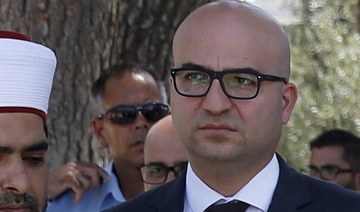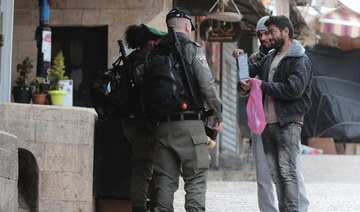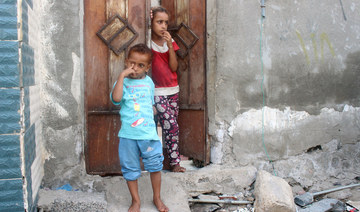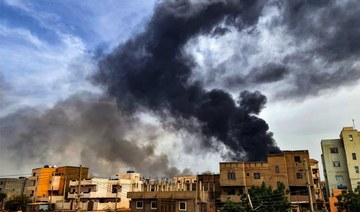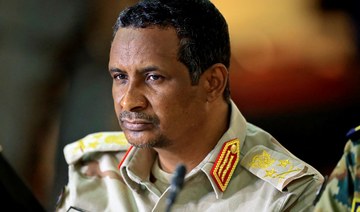JERUSALEM: A small group of Franciscan monks and Roman Catholic faithful took to the streets of Jerusalem’s Christian Quarter in the Old City Sunday to distribute olive branches after the traditional Palm Sunday procession was canceled due to restrictions imposed to contain the spread of coronavirus.
The march took place as Israel deployed troops to help contain an outbreak in a hard-hit city. Iran, dealing with the worst outbreak in the Mideast, announced plans to allow some businesses to reopen later this month even as the death toll continued to climb. Lebanon, meanwhile, reopened its airport to allow citizens who had been stranded overseas to return home.
Palm Sunday celebrations start the Holy Week leading up to Easter. Worshipers traditionally carry palm fronds and olive branches and march from the top of the Mount of Olives into Jerusalem’s Old City.
While thousands of pilgrims usually participate in the march, this year was limited to a handful of participants. Clerics and faithful went door to door often throwing the branches to Christians looking on from their balconies.
“This year because of the new situation we are trying to come to all the Christians in our Christian Quarter to bring these branches of olives, the sign of new hope,” said the Rev. Sandro Tomasevic, a Catholic clergyman at the Latin Parish of Jerusalem.
Palm Sunday commemorates Jesus’ entry into Jerusalem and is the start of the church’s most solemn week, which includes the Good Friday re-enactment of Jesus’ crucifixion and death and his resurrection on Easter.
In Israel, more than 8,000 people have contracted the coronavirus and 46 have died. In the West Bank, nearly 200 cases have been reported, including a large outbreak in the biblical town of Bethlehem.
The outbreak has forced church officials to close churches to the public and scale back religious observances throughout the week. Archbishop Pierbattista Pizzaballa, the top Catholic clergyman in the Holy Land, held a small, closed service at the Church of the Holy Sepulcher, the site where Christians believe Jesus was crucified and resurrected.
The coronavirus causes mild to moderate symptoms in most patients, who recover within a few weeks. But it is highly contagious and can be spread by people showing no symptoms. It can cause serious illness and death in some patients, particularly the elderly and those with underlying health issues.
Iran has been the hardest-hit nation across the region. Iran state TV reported that an additional 151 people had died, pushing the death toll to 3,603 with over 58,000 confirmed cases.
But the country’s president, Hassan Rouhani, announced that low-risk businesses will be allowed to resume their activities in Tehran on April 18. Businesses in other provinces will begin a week earlier, on April 11, he said during a meeting Saturday. He said government offices would also be able to boost staffing, from one-third to two-thirds of their work force, beginning April 11.
Rouhani said the decision would not contradict a stay-at-home policy and that businesses must still observe health restrictions ordered by the government. High-risk businesses, like pools, gyms and shopping malls will remain closed, he said.
In Lebanon, meanwhile, a jet carrying more than 70 Lebanese citizens who had been stuck in Saudi Arabia after Beirut’s international airport closed nearly three weeks arrived in Lebanon. It marked the beginning of flights that aim to return thousands of Lebanese from around the world. Three more flights are scheduled to arrive later Sunday from the United Arab Emirates, Nigeria and Ivory Coast.
The tiny Mediterranean country has reported 520 cases of coronavirus and 20 deaths since the first case was reported in late February.
Prime Minister Hassan Diab said up to 21,000 people have registered to return home, and the process will take several weeks.
In Israel, the military began an operation in the hard-hit city of Bnei Brak, helping to distribute food and medicine. The government last week put Bnei Brak, home to a large population of ultra-Orthodox religious Jews, under a near closure after an outbreak ravaged the city. Israel’s ultra-Orthodox population has been disproportionately infected after religious leaders played down or ignored warnings to maintain social distance early in the crisis. Meanwhile, a nursing home in the southern city of Beersheba reported its sixth death in recent days.
Jerusalem’s Palm Sunday march scaled back due to coronavirus
https://arab.news/vfxpr
Jerusalem’s Palm Sunday march scaled back due to coronavirus
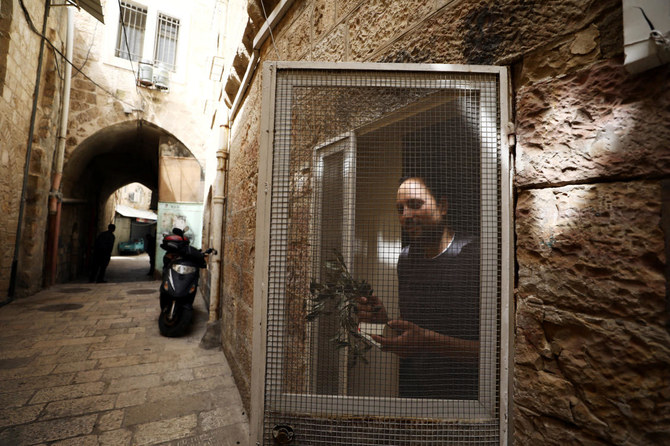
- Palm Sunday celebrations start the Holy Week leading up to Easter
- JERUSALEM: A small group of Franciscan monks and Roman Catholic faithful took to the streets of Jerusalem’s Christian Quarter in the Old City Sunday to distribute olive branches after the traditional Palm Sunday procession was canceled due to restrictions
Leaders of Jordan and Pakistan call UAE president to express concern about effects of severe storm

- Leaders passed on their best wishes to the country as it recovers from the storms
DUBAI: The president of the UAE, Sheikh Mohammed bin Zayed Al-Nahyan, received telephone calls from King Abdullah of Jordan and Pakistan’s Prime Minister Shehbaz Sharif on Friday, during which they expressed concern about the effects of the severe weather, including unusually heavy rainfall, that battered parts of the country this week.
They also passed on their best wishes to the country as it recovers from the storms and “conveyed their heartfelt hopes for the safety and prosperity of the UAE and its people, praying for their protection from any harm,” the Emirates News Agency reported.
Sheikh Mohammed thanked both leaders for their warm sentiments, and emphasized the strong bonds between the UAE and their nations.
The UAE and neighboring Oman were hit by unprecedented rainfall and flooding on Tuesday, with more than 250 millimeters of rain falling in parts of the Emirates, considerably more than is normally seen in a year. Dubai International Airport was forced to close temporarily when runways were flooded.
Peshmerga fighter dies in Turkish strike in north Iraq

JEDDAH: A member of the Kurdish Peshmerga security forces was killed on Friday in a Turkish drone strike in the autonomous Kurdistan region of northern Iraq.
Ankara regularly carries out ground and air operations in the region against positions of the outlawed PKK, the Kurdish separatist group that has waged a decades-long insurgency against the Turkish state.
The victim of Friday’s attack died in a drone strike on his vehicle, said Ihsan Chalabi, mayor of the mountainous Sidakan district near Iraq’s borders with Turkiye and Iran.
For decades, Turkiye has operated several dozen military bases in northern Iraq in its war against the PKK, which Ankara and its Western allies consider a terrorist group.
Both Baghdad and the Kurdish regional government have been accused of tolerating Turkiye’s military activities to preserve their close economic ties.
At the beginning of April, a man described as “high-ranking military official” from the PKK was killed in a Turkish drone strike on a car in the mountainous Sinjar region, according to the Kurdistan counterterrorism services.
Turkish President Recep Tayyip Erdogan is expected to visit Baghdad on Monday on his first official visit to Iraq since 2011.
Iraq’s Defense Minister Thabet Al-Abassi in March ruled out joint military operations against the PKK, but said that Turkiye and Iraq would “work to set up a joint intelligence coordination center.”
Middle East in ‘shadow of uncertainty due to regional conflicts’

WASHINGTON: Economies in the Middle East and North Africa face a “shadow of uncertainty” from ongoing tensions in the region, a senior IMF official said.
“We are in a context where the overall outlook is cast into shadows,” Jihad Azour, the International Monetary Fund’s director for the Middle East and Central Asia department, said in an interview in Washington.
“The shadow of uncertainty on the geopolitical side is an important one,” added Azour, a recent candidate for the next Lebanese president.
In the face of the ongoing conflicts in Gaza and Sudan and a recent cut to oil supplies by Gulf countries, the IMF has pared back its growth outlook for the Middle East and North Africa region once again.
FASTFACT
Economic activity in Gaza has ‘come to a standstill’ and the IMF estimates that economic output in the West Bank and Gaza contracted by six percent last year.
The IMF expects growth in MENA of 2.7 percent this year — 0.2 percentage points below its January forecast — before picking up again next year, the IMF said in its regional economic outlook report.
The risks to growth in the MENA region remain heightened, the IMF said, pointing to the danger of greater regional spillovers from the ongoing Israel-Gaza war.
“We have concerns about the immediate and lasting impact of conflict,” Azour said.
The IMF report said that economic activity in Gaza has “come to a standstill” and estimates that economic output in the West Bank and Gaza contracted by 6 percent last year.
The IMF said the report excludes economic projections for the West Bank and Gaza for the next five years “on account of the unusually high degree of uncertainty.”
The IMF cannot lend to the West Bank and Gaza because they are not IMF member countries.
However, Azour said it has provided the Palestinian Authority and the central bank with technical assistance during the current conflict.
“When we move into the reconstruction phase, we will be part of the international community support to the region,” he added.
Azour also discussed the situation in Sudan, where thousands have been killed in a civil war that has also devastated the economy, causing it to contract by almost 20 percent last year, according to the IMF.
“The country is barely functioning, institutions have been dismantled,” he said.
“And for an economy, for a country like Sudan, with all this potential, it’s important to stop the bleeding very quickly and move to a phase of reconstruction,” he added.
The recent Houthi attacks have particularly badly hit the Egyptian economy on Red Sea shipping, which caused trade through the Egypt-run Suez Canal to more than halve — depriving the country of a key source of foreign exchange.
Egypt reached an agreement last month to increase an existing IMF loan package from $3 billion to $8 billion after its central bank hiked interest rates and allowed the pound to plunge by nearly 40 percent.
A key pillar of the current IMF program is the privatization of Egypt’s state-owned enterprises, many of which are owned by or linked to the military.
“This is a priority for Egypt,” Azour said. Egypt needs to have a growing private sector and give space for the private sector to create more jobs.”
“We have an opportunity to re-engineer the state’s role, to give the state more responsibility as an enabler and less as a competitor,” he said.
Oxfam director urges global support for refugees in Jordan
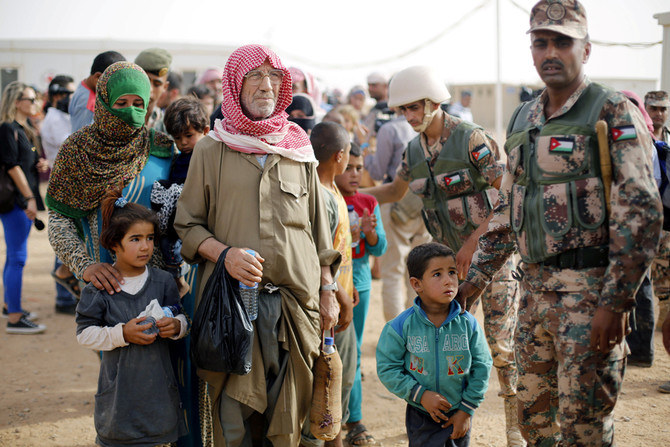
- Dmitry Medlev speaks of impact of over 3m people from neighboring areas
LONDON: Oxfam’s country director in Jordan said on Friday the global community had a responsibility to support refugees, especially in light of unrest in the Middle East.
In an interview with the Jordan News Agency, Dmitry Medlev described how an influx of over 3 million refugees from neighboring areas had stretched Jordan’s economic resources, disrupted local communities, and burdened public services.
He described the refugee’s experience as harrowing, often involving the painful process of abandoning the individual’s homeland and everything they held dear.
He said: “We are sending a message to the world not to overlook the refugee problem and to keep its focus on the new global disasters created by humans or caused by natural disasters, and the conflicts that have emerged in several countries recently, because the refugee problem is draining host countries and imposing additional burdens on them that they may not be able to bear in the future.”
Medlev called for enhanced international cooperation and adherence to international humanitarian law in supporting refugees, underscoring the need for long-term solutions to the ongoing crisis.
He also spoke of Oxfam’s initiatives in Jordan, such as the Waste to Positive Energy project in partnership with the Federal Ministry of Economic Cooperation and Development, and the EU, and executed with the German Corporation for International Cooperation. The project focuses on waste management and recycling in Zaatari Camp and Mafraq Governorate, processing about 30 tonnes of waste per day.
Medlev also pointed out Oxfam’s efforts in promoting economic and climate justice through grants aimed at empowering local projects led by women and youngsters. These grants help enhance project efficiency, ensure sustainability, and connect beneficiaries with supportive institutions.
He outlined Oxfam’s five-year strategy in Jordan, which focuses on gender justice, climate justice, and economic justice, and aims to bolster the country’s preparedness for disasters, enhance employment opportunities, and provide humanitarian support for refugees.
Jordan’s King Abdullah II told the UN General Assembly in September that the world must not abandon Palestinian refugees to the forces of despair.
Sudanese rue shattered dreams as war enters second year
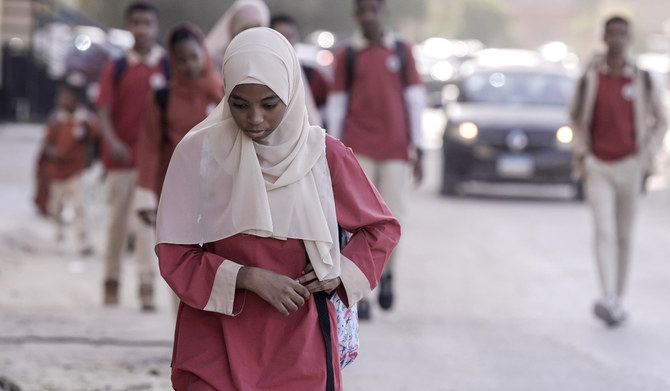
- Bashir’s ouster in April 2019 ushered in a civilian-led transition that saw an outpouring of “hope, inspiration and vibrancy” among young Sudanese, said Samah Salman, who worked in corporate venture capital then
DUBAI: Lawyer Omar Ushari still remembers the hope that gripped Khartoum after the uprising that overthrew President Omar Bashir in 2019. Now, after a year of war between rival generals, much of the Sudanese capital lies in ruins.
The 46-year-old, then detained for his activism, celebrated behind bars when Bashir was toppled in a palace coup.
In the heady days that followed, as the army promised a transition to elective civilian rule, Ushari was released and set to work on his dream project: a literary cafe near the banks of the Nile.
Named Rateena, his cafe swiftly became known as a safe haven for young activists eager to contribute to building a “better Sudan.”
But on April 15 last year, the Sudanese army and the paramilitary Rapid Support Forces went to war, and Ushari watched both his project and his dreams for the country “fade, bit by bit.”
BACKGROUND
Omar Bashir’s ouster in April 2019 ushered in a civilian-led transition that saw an outpouring of ‘hope, inspiration and vibrancy’ among young Sudanese, says Samah Salman, who worked in corporate venture capital then.
For months, he braved raging street battles to visit Rateena, “sit in the dark, take stock of what had been looted since my last visit, and reminisce.”
He did not understand how “the music that filled the space, the lectures and debates people shared, had been replaced with stray bullets strewn around me and the sound of tank fire outside.”
Now, as the war has entered its second year, with thousands dead and millions more driven from their homes, Ushari says he is “only one of the thousands of dreams shattered” — a microcosm of “a stolen revolution.”
Bashir’s ouster in April 2019 ushered in a civilian-led transition that saw an outpouring of “hope, inspiration and vibrancy” among young Sudanese, said Samah Salman, who worked in corporate venture capital then.
Startups were “springing up all across Sudan,” she said from the US, “all building extraordinary solutions to real needs ordinary Sudanese people were facing.”
Salman reviewed over 50 startups in telehealth, agritech, renewable energy, logistics, and fintech solutions, crediting the boom to “the energy of the revolution.”
According to Ushari, “hopes were high that Sudan was finally on the right path, out of the shadows and heading toward democracy, toward freedom.”
Like countless others, communications expert Raghdan Orsud, 36, wanted to play her part.
She co-founded Beam Reports to investigate disinformation in Sudan — “out of the belief in the role media can play in democratic transition,” she said from London.
But that transition ended in October 2021, two months after Beam Reports launched.
The same generals who would later go to war — army chief Gen. Abdel Fattah Al-Burhan and his then-deputy RSF commander Gen. Mohammed Hamdan Dagalo — ousted civilians from the transitional administration.
“Nothing was the same after the coup,” Ushari said.
“It was a painful time. They were killing protesters every week, but still, we had hope.”
Then, one fateful Saturday at the end of Ramadan, the people of Khartoum awoke to the sounds of air strikes and shelling as their worst fears came true: the erstwhile allies had turned their guns on each other.
Bodies began piling up on the streets as vicious urban warfare drove millions to flee.
Orsud had just bought studio-grade recording equipment, “still in their boxes,” when RSF paramilitaries seized and looted her offices.
Ushari was piecing together a life in Cairo when he received a video message showing a massive fire.
“That’s how I found out Rateena had burned down,” he said.
Countless Sudanese in the diaspora — who had spent decades saving up to build their Khartoum homes — have been forced to watch from afar as the RSF looted them.
“At some point, he was praying for an airstrike to hit the house,” pastry chef Shaimaa Adlan, 29, said in Cairo, referring to her father in Saudi Arabia.
“He would have rather seen it destroyed than know his life’s work was being used as a paramilitary base.”
Adlan had started a catering business in Khartoum before finding herself in Egypt — uprooted and jobless.
But barely a year later, she sprints through a bustling kitchen in Cairo, shouting orders to her staff and fussing over dishes.
Back home, Salman says the war has not crushed Sudanese entrepreneurialism, just redirected it.
She said tech entrepreneurs now crowdsource real-time safety updates instead of protest plans and optimize evacuation paths instead of delivery routes.
The same young people organizing demonstrations now coordinate aid, becoming what the UN calls “the front line” of humanitarian response.
And in displacement centers and the diaspora, the dream of a new Sudan has not been forgotten.
“No matter where we’ve been exiled or what remote Sudanese state we’ve ended up in, there’s still a spark of the revolution left in every heart,” Ushari said.
“Sudan is ours, it’s all of ours,” said Orsud, whose fact-checking team has resumed operations from Nairobi.
“What else would we do besides rebuild it, over and over?“



